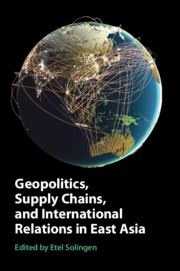Book contents
- Geopolitics, Supply Chains, and International Relations in East Asia
- Geopolitics, Supply Chains, and International Relations in East Asia
- Copyright page
- Dedication
- Contents
- Figures
- Tables
- Contributors
- Preface and Acknowledgements
- 1 Introduction: Geopolitical Shocks and Global Supply Chains
- Part I Global Supply Chains, Geopolitics, and Trade Wars
- Part II Domestic Political, Economic, and Social Dimensions of Global Supply Chains
- 8 Are Global Supply Chains Vital to China’s Leaders?
- 9 Firms Fight Back: Production Networks and Corporate Opposition to the China Trade War
- 10 Understanding and Contesting Global Supply Chains in an Era of Inequality
- 11 Why Escalate? Cognitive Theory and Global Supply Chains in Northeast Asia
- 12 The Role of Chinese Workers in Supply Chain Campaigns
- Part III Postscript on Covid-19
- References
- Index
11 - Why Escalate? Cognitive Theory and Global Supply Chains in Northeast Asia
from Part II - Domestic Political, Economic, and Social Dimensions of Global Supply Chains
Published online by Cambridge University Press: 07 May 2021
- Geopolitics, Supply Chains, and International Relations in East Asia
- Geopolitics, Supply Chains, and International Relations in East Asia
- Copyright page
- Dedication
- Contents
- Figures
- Tables
- Contributors
- Preface and Acknowledgements
- 1 Introduction: Geopolitical Shocks and Global Supply Chains
- Part I Global Supply Chains, Geopolitics, and Trade Wars
- Part II Domestic Political, Economic, and Social Dimensions of Global Supply Chains
- 8 Are Global Supply Chains Vital to China’s Leaders?
- 9 Firms Fight Back: Production Networks and Corporate Opposition to the China Trade War
- 10 Understanding and Contesting Global Supply Chains in an Era of Inequality
- 11 Why Escalate? Cognitive Theory and Global Supply Chains in Northeast Asia
- 12 The Role of Chinese Workers in Supply Chain Campaigns
- Part III Postscript on Covid-19
- References
- Index
Summary
Why do some state leaders choose to escalate conflicts with close economic partners while others refrain? This chapter explores how a state’s perception of its relative position in a shared supply chain influences its response to conflict, by applying the psychological framework provided by prospect theory. When a state’s key industries are more dependent on the opponent within their shared supply chains, its leaders are more likely to escalate conflicts. This asymmetry in dependency makes policymakers see themselves as being in a strategically disadvantageous position, and the prospect of being replaced in the supply chains predisposes them towards more risk-seeking behavior. By contrast, when a state holds relative dominance within its shared supply chains, its leaders are less likely to risk conflict escalation. They perceive themselves as occupying a superior strategic position and will act in a relatively risk-averse manner to avoid further losses. This theoretical framework is employed to analyze two empirical cases: the ongoing trade conflict between South Korea and Japan and the conflict between South Korea and China over Terminal High Altitude Area Defense (THAAD).
Keywords
- Type
- Chapter
- Information
- Publisher: Cambridge University PressPrint publication year: 2021
- 2
- Cited by

